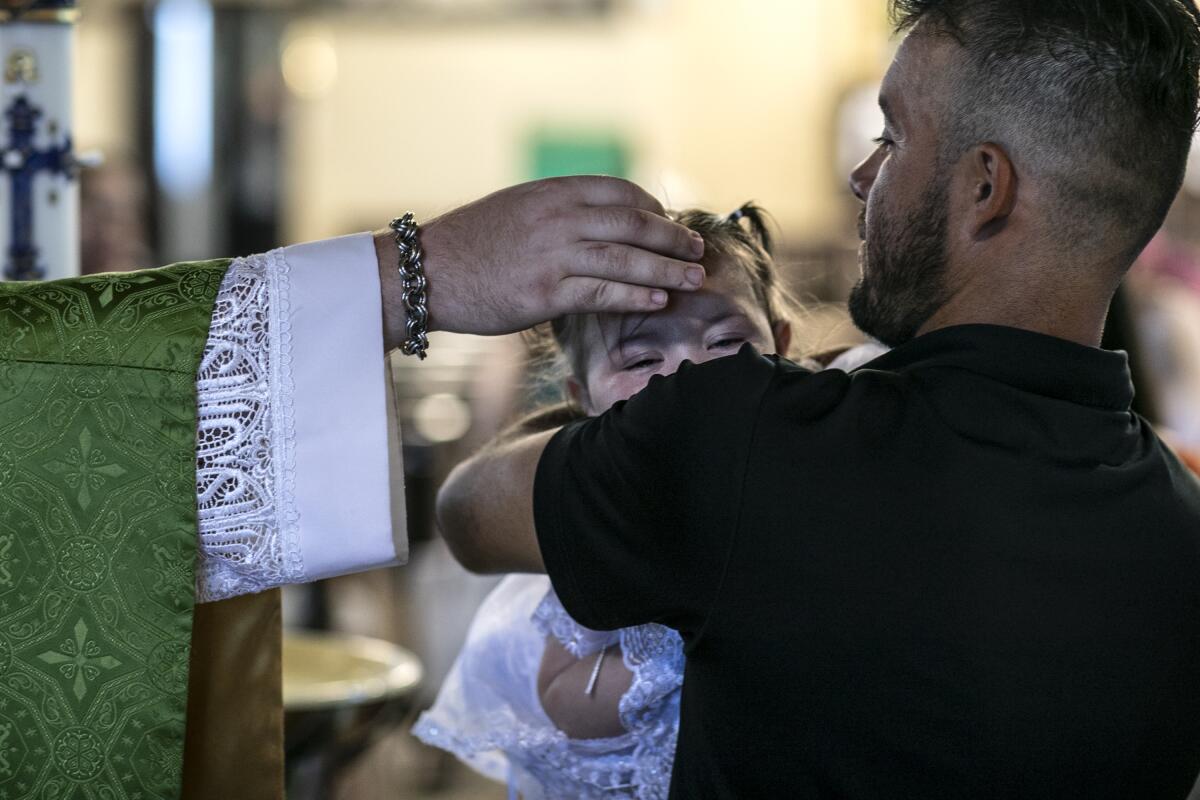Letters to the Editor: Why those botched Catholic baptisms are a big deal

- Share via
To the editor: I am guessing that non-Catholics reading about the priest who made a crucial error in thousands of baptisms are wondering if this is just a tempest at the tabernacle. Far from just a shuffling of the deck chairs, there is a very valid theological point in the incorrect wording.
Since the baptizing priest acts in “personal Christi,” the use of “I” in the rite is critical. Instead, the priest said “we.”
There is a good theological argument for using “we.” Most baptisms are held in the presence of family and others, and the “we” connotes the presence of the community, the Body of Christ. But the “I” position has the overwhelming weight of tradition on its side, and we should defer without argument.
However, the solutions inferred in the article are an overreach. Any diocesan bishop can grant a “spiritual mulligan” to the “we” folks and avoid the angst of traditional Catholics who are struggling with this news.
For my part, I was baptized in the kitchen sink by a mother who feared I might die and go to the mystical place called Limbo — another theological issue for another day.
Theodore Furlow, Long Beach
..
To the editor: How embarrassing. As an active lifelong Catholic and who is well educated in biblical linguistics, I thought the age of “Pharisees’ phylacteries,” as Jesus condemned them, was long past.
Apparently it’s not, since church laity and clergy are profusely apologizing for using the pronoun “we” instead of “I” in a critical communal event in the life of many Catholics and non-Catholics alike.
Right now, the worldwide Catholic Church is soliciting input for an upcoming Vatican synod on what is going well and what is not. I suggest this theological phylactery is an example of what is not.
It is clear that many phylacteries and “specks” in the eyes of church hierarchy and us common folk remain.
Darlene Pienta, San Marcos
..
To the editor: As a former seminarian and now an almost lapsed Catholic, should I worry if the priest who baptized me garbled the Latin?
Until Vatican II, I heard many a priest at Mass do a hatchet job with the Latin. Some 83 years ago when I was baptized, the rituals of the church were still conducted in Latin, which those who opposed the change to English in the U.S. said was a sacred liturgical language.
When you get down to it, it doesn’t seem to matter a jot or tittle what language is used when one is baptized, be it Latin, English, Swahili or Arabic.
And so why should it matter if the priest screwed up the Latin, then? Surely over the centuries there were plenty of times when the good padre made a mistake, or even intentionally said “nos te baptizamus” instead of the canonically correct “ego te baptizo.”
A theologian in the know would say, “It’s the intention that is the operative word.” Now, as a professional linguist, I hold strongly to the dictum that words count, as do performative acts in legal contracts, so I don’t lightly dismiss the concerns of the bureaucrats in Rome.
But surely, they have better things to do than to continually alienate and scandalize the faithful.
Thomas Hinnebusch, Los Angeles





